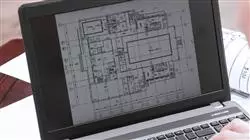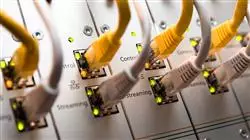University certificate
Scientific endorser

The world's largest faculty of engineering”
Introduction to the Program
A Professional master’s degree adapted to the forefront of Telecommunications Engineering and in which you will find the most accurate and innovative information to improve your professional skills in just 12 months”

The development of 5G and the range of possibilities that have arisen from this mobile technology clearly reflect the fact that telecommunications is constantly growing and reinventing itself. Between the 1970s and 1980s, when the Internet began to take its first steps with ARPAnet, CERN workers never imagined that, decades later, their small project, then revolutionary, would just be the seed of a large industry that today moves incalculable amounts of information from one end of the world to the other in milliseconds. The fifth generation of this technology already allows access to a very high connection speed, reducing latency to a minimum and considerably increasing the number of devices connected to the same network.
It is, therefore, a complex field that requires a very high level of technical expertise to work in, as well as detailed knowledge of the continual advances in the development of network systems and services. Therefore, if the professional wishes to specialize in this area, they must have a program that provides them with everything necessary to do so, such as this very comprehensive Professional master’s degree. Through 1,500 hours of the best theoretical-practical and additional content, the graduate will be able to update their knowledge in relation to switching, computing and telecommunications infrastructures, becoming a true expert in networks, digital systems, signal management and analog and digital electronics.
All this 100% online and in only 12 months of the most dynamic, innovative and comprehensive professional development that currently exists in the academic market. In addition, you will be able to access the Virtual Campus whenever you want, since TECH offers its programs without schedules or face-to-face classes and with the possibility of connecting from any device with an internet connection. It is, thus, a unique opportunity to acquire the highest-level Telecommunications Engineering tools through a program that will elevate your talent as an engineer to the top of the industrial sector.
You will stand out for your thorough management of computer networks, their typology and their interconnection elements”
This Professional master’s degree in Telecommunications Engineering contains the most complete and up-to-date educational program on the market. Its most notable features are:
- Case studies presented by experts in Telecommunications Engineering
- The graphic, schematic, and practical contents with which they are created, provide practical information on the disciplines that are essential for professional practice
- Practical exercises where self-assessment can be used to improve learning
- A special emphasis on innovative methodologies
- Theoretical lessons, questions to the expert, debate forums on controversial topics, and individual reflection assignments
- Content that is accessible from any fixed or portable device with an internet connection
A Professional master’s degree with which you will deepen your knowledge of electronics and essential Telecommunications Engineering equipment, acquiring a professional command of the most complex tools”
The program’s teaching staff includes professionals from the sector who contribute their work experience to this degree program, as well as renowned specialists from leading societies and prestigious universities.
The multimedia content, developed with the latest educational technology, will provide the professional with situated and contextual learning, i.e., a simulated environment that will provide immersive learning designed for real situations.
This program is designed around Problem-Based Learning, whereby the professional must try to resolve the different professional practice situations that arise during the academic year. For this purpose, the student will be assisted by an innovative interactive video system created by renowned and experienced experts.
You will have access to the Virtual Campus whenever you need it: without limits, without timetables and from any device with internet connection"

The perfect academic choice to get up to date on the construction and management of ISDN and FR infrastructures and stand out in a booming sector"
Why study at TECH?
TECH is the world’s largest online university. With an impressive catalog of more than 14,000 university programs available in 11 languages, it is positioned as a leader in employability, with a 99% job placement rate. In addition, it relies on an enormous faculty of more than 6,000 professors of the highest international renown.

Study at the world's largest online university and guarantee your professional success. The future starts at TECH”
The world’s best online university according to FORBES
The prestigious Forbes magazine, specialized in business and finance, has highlighted TECH as “the world's best online university” This is what they have recently stated in an article in their digital edition in which they echo the success story of this institution, “thanks to the academic offer it provides, the selection of its teaching staff, and an innovative learning method aimed at educating the professionals of the future”
A revolutionary study method, a cutting-edge faculty and a practical focus: the key to TECH's success.
The most complete study plans on the university scene
TECH offers the most complete study plans on the university scene, with syllabuses that cover fundamental concepts and, at the same time, the main scientific advances in their specific scientific areas. In addition, these programs are continuously being updated to guarantee students the academic vanguard and the most in-demand professional skills. In this way, the university's qualifications provide its graduates with a significant advantage to propel their careers to success.
TECH offers the most comprehensive and intensive study plans on the current university scene.
A world-class teaching staff
TECH's teaching staff is made up of more than 6,000 professors with the highest international recognition. Professors, researchers and top executives of multinational companies, including Isaiah Covington, performance coach of the Boston Celtics; Magda Romanska, principal investigator at Harvard MetaLAB; Ignacio Wistumba, chairman of the department of translational molecular pathology at MD Anderson Cancer Center; and D.W. Pine, creative director of TIME magazine, among others.
Internationally renowned experts, specialized in different branches of Health, Technology, Communication and Business, form part of the TECH faculty.
A unique learning method
TECH is the first university to use Relearning in all its programs. It is the best online learning methodology, accredited with international teaching quality certifications, provided by prestigious educational agencies. In addition, this disruptive educational model is complemented with the “Case Method”, thereby setting up a unique online teaching strategy. Innovative teaching resources are also implemented, including detailed videos, infographics and interactive summaries.
TECH combines Relearning and the Case Method in all its university programs to guarantee excellent theoretical and practical learning, studying whenever and wherever you want.
The world's largest online university
TECH is the world’s largest online university. We are the largest educational institution, with the best and widest online educational catalog, one hundred percent online and covering the vast majority of areas of knowledge. We offer a large selection of our own degrees and accredited online undergraduate and postgraduate degrees. In total, more than 14,000 university degrees, in eleven different languages, make us the largest educational largest in the world.
TECH has the world's most extensive catalog of academic and official programs, available in more than 11 languages.
Google Premier Partner
The American technology giant has awarded TECH the Google Google Premier Partner badge. This award, which is only available to 3% of the world's companies, highlights the efficient, flexible and tailored experience that this university provides to students. The recognition as a Google Premier Partner not only accredits the maximum rigor, performance and investment in TECH's digital infrastructures, but also places this university as one of the world's leading technology companies.
Google has positioned TECH in the top 3% of the world's most important technology companies by awarding it its Google Premier Partner badge.
The official online university of the NBA
TECH is the official online university of the NBA. Thanks to our agreement with the biggest league in basketball, we offer our students exclusive university programs, as well as a wide variety of educational resources focused on the business of the league and other areas of the sports industry. Each program is made up of a uniquely designed syllabus and features exceptional guest hosts: professionals with a distinguished sports background who will offer their expertise on the most relevant topics.
TECH has been selected by the NBA, the world's top basketball league, as its official online university.
The top-rated university by its students
Students have positioned TECH as the world's top-rated university on the main review websites, with a highest rating of 4.9 out of 5, obtained from more than 1,000 reviews. These results consolidate TECH as the benchmark university institution at an international level, reflecting the excellence and positive impact of its educational model.” reflecting the excellence and positive impact of its educational model.”
TECH is the world’s top-rated university by its students.
Leaders in employability
TECH has managed to become the leading university in employability. 99% of its students obtain jobs in the academic field they have studied, within one year of completing any of the university's programs. A similar number achieve immediate career enhancement. All this thanks to a study methodology that bases its effectiveness on the acquisition of practical skills, which are absolutely necessary for professional development.
99% of TECH graduates find a job within a year of completing their studies.
Professional Master's Degree in Telecommunication Engineering
.
Telecommunications engineering addresses different fields, from the design and development of services to multimedia and broadband communication applications, as a result of this and the constant evolution in the field, engineers every day are in search of new knowledge to enhance their skills and take their careers to the next level. At TECH we have a Professional Master's Degree in Telecommunication Engineering, a highly qualified specialization that will allow you to reinforce all your knowledge to become an expert. This program is designed to provide comprehensive learning and promote the development of network designs and installations; also, you will be able to learn in depth about analog and digital electronics, switching networks, telecommunications infrastructure and electronics and instrumentation. While you learn you will be able to train with the best online teaching tools and have the continuous support of professionals in the sector.
Get a Professional Master's Degree and be an expert in telecommunications engineering
.
At TECH we have the largest Faculty of Computer Science in the world, we provide you with an exceptional methodology that will allow you to acquire the necessary knowledge to develop your skills and acquire new intellect in topics such as efficient communication systems, radio services, mobile communications networks, random signals and advanced linear systems in technology. Throughout 1,500 hours of completely online teaching, you will be able to specialize in a unique program, which will allow you to adapt to constant changes and learn about the most up-to-date tools and/or techniques. In addition, you will be able to carry out case studies designed and tested by expert engineers, as well as participate in forums to exchange information and create learning relationships. In this way, you will be able to complement your education with theoretical lessons and reflective work. If you want to achieve a level of prestige and recognition in this field, take this Professional Master's Degree that will help you improve your resume and increase your job opportunities by 99%.







